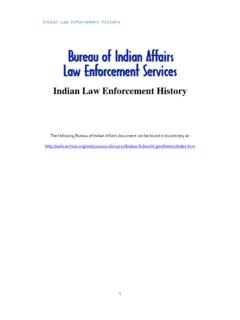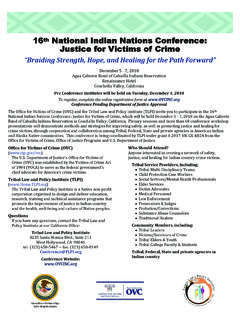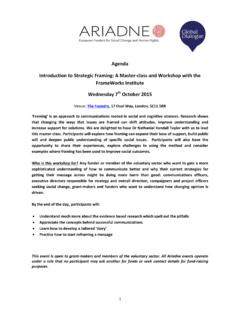Transcription of Introducing Relational-Cultural Theory
1 11 Jean Baker Miller Training Institute 20031 Introducing Introducing RelationalRelational-- cultural cultural Theory : Theory : A New Model of A New Model of Psychological DevelopmentPsychological Development Jean Baker Jean Baker Miller Miller Training Training InstituteInstitute at the Stone Center part of the Wellesley Centers for Women at Wellesley College Linda M. Hartling, , Jean Baker Miller, , Judith V. Jordan, , & Maureen Walker, Baker Miller Training Institute 20032 Traditional Theories of Traditional Theories of Psychological Psychological DevelopmentDevelopment Growth involves a process of separating from relationships. Growth is a process of becoming more independent, autonomous, Baker Miller Training Institute 20033 Relational-Cultural Theory Proposes Growth-fostering relationships are a central human necessity throughout our lives and chronic disconnections are the source of psychological problems. Relationships are highly defined by the cultural Baker Miller Training Institute 20034 Reflecting on Reflecting on of someone who Think of someone who contributed positively to your contributed positively to your did that person How did that person make a difference?
2 Make a difference? of a time that you felt you Think of a time that you felt you contributed to the growth of contributed to the growth of another personanother did you What did you do that made a difference?do that made a difference?33 Jean Baker Miller Training Institute 20035 What are the outcomes What are the outcomes of a growthof a growth--fostering fostering relationships?relationships? Zest or Energy Action Clarity Sense of Worth Desire for More Connection The Five Good ThingsThe Five Good Things Jean Baker Miller, Baker Miller Training Institute 20036 Five Outcomes of Five Outcomes of DisconnectionDisconnection Diminished EnergyDiminished Energy Diminished ActionDiminished Action ConfusionConfusion Diminished Sense of WorthDiminished Sense of Worth Avoid RelationshipsAvoid RelationshipsIsolationIsolation44 Jean Baker Miller Training Institute 20037 Zest, energy Action Clarity Sense of Worth Desire for More Relationships Good Conflict Less energy Diminished Action Confusion Diminished Sense of Worth Turning Away from Relationships Destructive conflictCONNECTIONCONNECTIONMOREMORECONN ECTIONCONNECTIONE nhancedEnhancedCONNECTIONCONNECTIONTHE EBB AND FLOWOF RELATIONSHIPSDISCONNECTIONDISCONNECTIONJ ean Baker Miller Training Institute 20038 Mutual Empathy A two-way (or more)
3 Dynamic process that functions as a central component of psychological growth. Connection based on the authentic thoughts and feelings of all the participants in the Concepts in RCTKey Concepts in RCTM utual EmpathyMutual EmpathyMutual Empowerment Mutual Empowerment A two-way (or more) dynamic process that functions as a central component of psychological growth, which grows out of mutual empathy in a relationship (Jordan, 1986). The five good thingslead to the outcome of mutual Baker Miller Training Institute 20039 Key Concepts in RCTKey Concepts in RCT Authenticity Authenticity is ever-evolving, not achieved at any one moment it is a person s ongoing ability to represent herself in relationships more fully (Miller, 1999); with awareness of the possible impact on the other person (Jordan, 2003)..authenticity is a process in movement we move in and out of more or less authenticity as a consequence of the relational dynamics (Miller, 1999). Movement Toward Mutuality A dynamic process in which the individuals engaged in a relationship are increasingly able to be authentic and authentically responsive to each other s thoughts and feelings.
4 Movement toward emotional and cognitive action that benefits both people in a relationship, which involves mutual empathy, authenticity, mutual empowerment, and mutual Baker Miller Training Institute 200310 Each Person in a Relationship Embodies the Culture Each person has multiple social identities. race, gender, class, sexual orientation, etc. Social identities are stratified. dominant subordinate, better than less than (Walker, 1999).Culture and Connection Difference and Power Differences are profoundly stratification, not the difference, constrains our capacity for authenticity and undermines our desire for connection (Walker, 2002). Power-over practices Suppress difference. Interpret difference as opposition. Diminishes authentic engagement in relationships. Impedes movement toward mutuality in relationships. Limits one s ability to find and engage in growth-fostering Baker Miller Training Institute 200311 GrowingGrowing--Fostering Fostering A relationship with one supportive adult is A relationship with one supportive adult is associated with good outcomes when associated with good outcomes when children are faced with:children are faced with: Parent mental illness (Rutter, 1979).
5 Parent mental illness (Rutter, 1979). Separation from a parent (Rutter, 1971).Separation from a parent (Rutter, 1971). Marital discord (Rutter, 1971).Marital discord (Rutter, 1971). Divorce (Wallerstein & Kelly, 1990).Divorce (Wallerstein & Kelly, 1990). Poverty (Garmezy, 1991).Poverty (Garmezy, 1991). Child maltreatment (Cicchetti, 1989).Child maltreatment (Cicchetti, 1989). Multifaceted or combinations of risk factors (Seifer et Multifaceted or combinations of risk factors (Seifer et al., 1996)al., 1996).. ParentParent--Family ConnectionsFamily Connections Study of over 36,000 adolescents in grades 7 Study of over 36,000 adolescents in grades 7--12 found 12 found that parentthat parent--family connectedness provided adolescents family connectedness provided adolescents with protection against emotional distress and suicide with protection against emotional distress and suicide (Resnick, et al., 1993).(Resnick, et al., 1993). ParentParent--School ConnectionsSchool Connections Study of 12,000 adolescents, independent of race, Study of 12,000 adolescents, independent of race, class, SES, connection reduced an adolescentclass, SES, connection reduced an adolescent s risk of s risk of violence, substance abuse, depression, early sexual violence, substance abuse, depression, early sexual activity, suicidal behavior (Resnick et al.)
6 , 1997).activity, suicidal behavior (Resnick et al., 1997). School ConnectionsSchool Connections Survey of 90,000+ adolescents from 80 different communities showed that students who felt connected were less likely to use cigarettes, alcohol, or drugs; less likely to engage in early sexual activity, violence, or become pregnant; and less likely to experience emotional distress. (Blum, McNeely, & Rinehart, 2002).Jean Baker Miller Training Institute 200312 Connection Throughout Connection Throughout Our LivesOur Lives Adult ConnectionsAdult ConnectionsOne example,Berkman & Syme (1979)demonstrated that men and women who had contact with close friends and relatives, who were married, or who had informal or formal group had lower mortality rates than respondents lacking such connections (p. 188). Community/Social ConnectednessCommunity/Social Connectedness In his national analysis of social connectedness, Harvard professor Robert Putnam (2000) noted that studies.
7 Have established beyond reasonable doubt that social connectedness is one of the most powerful determinants of our well-being (p. 326)..happiness is best predicted by the breadth and depth of one s social connections (p. 332). Continuing Mutual Psychological Development Questionnaire relational Health Indices JBMTI Research Network77 Jean Baker Miller Training Institute 200313 Relationships in Relationships in Therapy and ChangeTherapy and ChangeExpectancy(Placebo Effects)15%Extratherapeutic Change40%TherapeuticRelationship30%Techn iques15% Lambert (1992). The Handbook of Psychology Integration. Basic Books, p. , Duncan, B. L.,& Miller, S. D. (1999). The Heart and Soul of Change: What Works in , : American Psychological of Improvement in Psychotherapy Patients as a Function of Therapeutic Factors( , ego strength, fortuitous events, social support,etc.)Jean Baker Miller Training Institute 200314 RelationalRelational-- cultural cultural Therapy in PracticeTherapy in Practice Developing mutual empathyDeveloping mutual empathy Attending to the quality of Attending to the quality of connection in the relationship connection in the relationship Attending to the impact of power Attending to the impact of power on therapy and other on therapy and other relationshipsrelationships Understanding and honoring Understanding and honoring strategies of disconnectionstrategies of disconnection Understanding relational and Understanding relational and controlling imagescontrolling images88 Jean Baker Miller Training Institute 200315 RelationalRelational-- cultural cultural Therapy in PracticeTherapy in Reversing the central Reversing the central relational paradox: relational paradox: Defined: In the face of repeated experiences of disconnection, people yearn even more for relationships.
8 However, they also become so afraid of engaging with others that they keep important parts of the themselves out of relationship, , they develop techniques for staying our of connection (Miller & Stiver,1997) The therapist is empathic with both sides The therapist is empathic with both sides of the relational paradox: yearning for of the relational paradox: yearning for connection and strategies of connection and strategies of Isolation and relational images shift as Isolation and relational images shift as clients move back into growthclients move back into growth--fostering fostering Goal of The Goal of the growth of mutually empowering RCT leads to a new and enlarged vision of human possibilities in all realms of life. ~ Jean Baker Miller, Baker Miller, Baker Miller Jean Baker Miller Training InstituteTraining InstituteStone Center, Wellesley CollegeStone Center, Wellesley CollegeWellesley, MA 02481 Wellesley, MA




